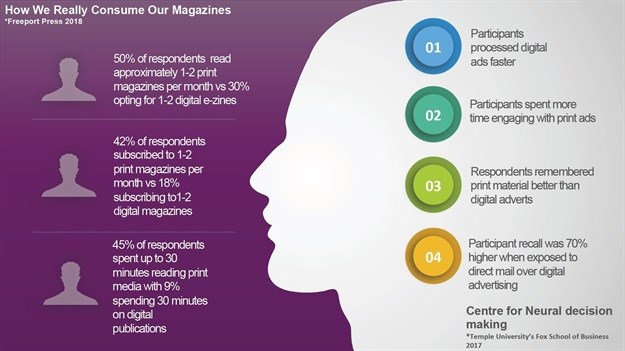#BizTrends2019: The revival of print

Whilst it would be remiss, renegade and barefaced professional suicide to have not taken a hardline digital integration approach into your traditional PR services, print shows no sign of dying; let me explain why.
Logic dictates that the millennial basket of digital natives are of the conviction that content should be free and accessible to all, they believe it to be a civic and democratic right. They’re not wrong, free content negates a barrier to entry when connecting with your audience.
Smelling the roses
Whilst the immediate delivery of content through screen engagement is no doubt the best sniper in a campaign arsenal, we still remain human beneath our digital exoskeletons and our primitive sensory responses to smell and touch remain the most powerful triggers. The holistic and inexplicably tangible experience of reading print hasn’t escaped millennials and it’s this contingency that takes the lead in reading consumption behaviour. Research shows that Gen Y prefers print books to e-books according to an article published on Forbes.com. The interpretation of this research suggests an upward trend in modernising the old school – enter the resurgence of print. By no means is hard copy going to dethrone digital but it is merging with online funnels as part of a united front in multichannel strategy. The sweet spot is how you execute its integration tactically.
This time with feeling
Memory generates emotion, which translates into positive brand sentiment. According to a study conducted by Millward Brown, when sample groups were presented with digital and printed advertising materials, the tangible content left a deeper footprint in the brain. Not only because the physical materials stimulated both sight and touch but also because activity generated in the area of the brain associated with the integration of visual and spatial information was significant, suggesting that physical material is more ‘real’ to the brain, it has a meaning, and a place. To further compound this, evidence revealed that the print matter produced more brain responses connected with internal feelings, suggesting greater ‘internalisation’ of the ads.

Removing the print fear factor
Print is not unknown territory for you, but you might find yourself flummoxed how to integrate it into a progressive digital campaign. Here are some ideas:
QR codes and personalised URLs: Scans and click throughs are easily measured and tracked. Think printed T-shirts, advertorials and more.
Digital opt-ins on printed materials: If websites, apps and social media offer immediate delivery and convenience, print creates an altogether more sensory experience through imagery, paper weight and feel in a way that digital can’t. Through magazine and newspaper reader advocacy, you’re providing a conduit to prompt readers with digital opt ins to other marketing materials.
Marry print and social media: Social and digital still lead the march. That being said, through posting relevant content on your social media channels you’re able to direct consumers to print campaigns and conversely through print materials drive audiences back to your online efforts.
Campaigns are represented in multiple mediums throughout the buying cycle and all touchpoints create an overall perception of your brand with each channel triggering diverse responses and call to action behaviours – one marketing channel may cater to users at a particular stage of their buying cycle, but it is impossible for a binary marketing channel to play to all stages.

About Sam Swaine
Sam Swaine is a freelance consultant with over 20-year's experience in marketing and PR. She also specialises in social media and digital marketing trends. Sam is a journalist for business, marketing and consumer publications.Related
The strategic role of graphic design in branding and marketing 13 Mar 2025 ABC Q4 2024: Last quarter cements a mixed bag for 2024 for newspapers 20 Feb 2025 ABC Q4 2024: Magazines show resilience in 2024 20 Feb 2025 Print is not dead as community and special-interest media thrive 21 Jan 2025 2025 Tabbie Awards competition open 9 Jan 2025 The changing role of annual reports in driving B2B narratives 28 Nov 2024





























